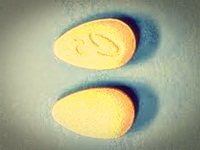Cialis (Tadalafil) Patient Information
Detailed Cialis Pharmacology - Usage, Dosage, Side Effects.
Pronounced See-Al-iss
Cialis (tadalafil) Full Prescribing Information
Read the Patient Information about CIALIS before you start taking it and again each time you get a refill. There may be new information. You may also find it helpful to share this information with your partner. This leaflet does not take the place of talking with your doctor. You and your doctor should talk about CIALIS when you start taking it and at regular checkups. If you do not understand the information or have questions, talk with your doctor or pharmacist.
What important information should you know about CIALIS?
CIALIS can cause your blood pressure to drop suddenly to an unsafe level if it is taken with certain other medicines. You could get dizzy, faint, or have a heart attack or stroke.
Do not take CIALIS if you:
- take any medicines called "nitrates."
- use recreational drugs called "poppers" like amyl nitrite and butyl nitrite.
(See "Who should not take CIALIS?")
Tell all your healthcare providers that you take CIALIS. If you need emergency medical care for a heart problem, it will be important for your healthcare provider to know when you last took CIALIS.
After taking a single tablet, some of the active ingredient of CIALIS remains in your body for more than 2 days. The active ingredient can remain longer if you have problems with your kidneys or liver, or you are taking certain other medications (see "Can other medications affect CIALIS?").
 What is CIALIS?
What is CIALIS?
CIALIS is a prescription medicine taken by mouth for the treatment of erectile dysfunction (ED) in men.
ED is a condition where the penis does not harden and expand when a man is sexually excited, or when he cannot keep an erection. A man who has trouble getting or keeping an erection should see his doctor for help if the condition bothers him. CIALIS may help a man with ED get and keep an erection when he is sexually excited.
CIALIS does not:
- cure ED
- increase a man's sexual desire
- protect a man or his partner from sexually transmitted diseases, including HIV. Speak to your doctor about ways to guard against sexually transmitted diseases.
- serve as a male form of birth control
CIALIS is only for men with ED. CIALIS is not for women or children. CIALIS must be used only under a doctor's care.
How does CIALIS work?
When a man is sexually stimulated, his body's normal physical response is to increase blood flow to his penis. This results in an erection. CIALIS helps increase blood flow to the penis and may help men with ED get and keep an erection satisfactory for sexual activity. Once a man has completed sexual activity, blood flow to his penis decreases, and his erection goes away.
Who can take CIALIS?
Talk to your doctor to decide if CIALIS is right for you.
CIALIS has been shown to be effective in men over the age of 18 years who have erectile dysfunction, including men with diabetes or who have undergone prostatectomy.
Who should not take CIALIS?
Do not take CIALIS if you:
- take any medicines called "nitrates" (See "What important information should you know about CIALIS?"). Nitrates are commonly used to treat angina. Angina is a symptom of heart disease and can cause pain in your chest, jaw, or down your arm.
Medicines called nitrates include nitroglycerin that is found in tablets, sprays, ointments, pastes, or patches. Nitrates can also be found in other medicines such as isosorbide dinitrate or isosorbide mononitrate. Some recreational drugs called "poppers" also contain nitrates, such as amyl nitrite and butyl nitrite. Do not use CIALIS if you are using these drugs. Ask your doctor or pharmacist if you are not sure if any of your medicines are nitrates. - you have been told by your healthcare provider to not have sexual activity because of health problems. Sexual activity can put an extra strain on your heart, especially if your heart is already weak from a heart attack or heart disease.
- are allergic to CIALIS or any of its ingredients. The active ingredient in CIALIS is called tadalafil. See the end of this leaflet for a complete list of ingredients.
What should you discuss with your doctor before taking CIALIS?
Before taking CIALIS, tell your doctor about all your medical problems, including if you:
- have heart problems such as angina, heart failure, irregular heartbeats, or have had a heart attack. Ask your doctor if it is safe for you to have sexual activity.
- have low blood pressure or have high blood pressure that is not controlled
- have had a stroke
- have liver problems
- have kidney problems or require dialysis
- have retinitis pigmentosa, a rare genetic (runs in families) eye disease have ever had severe vision loss, including a condition called NAION
- have stomach ulcers
- have a bleeding problem
- have a deformed penis shape or Peyronie's disease
- have had an erection that lasted more than 4 hours
- have blood cell problems such as sickle cell anemia, multiple myeloma, or leukemia
Can other medications affect CIALIS?
Tell your doctor about all the medicines you take including prescription and non-prescription medicines, vitamins, and herbal supplements. CIALIS and other medicines may affect each other. Always check with your doctor before starting or stopping any medicines. Especially tell your doctor if you take any of the following:*
- medicines called nitrates (See "What important information should you know about CIALIS?")
- medicines called alpha blockers. These include Hytrin® (terazosin HCl), Flomax® (tamsulosin HCl), Cardura® (doxazosin mesylate), Minipress® (prazosin HCl) or Uroxatral® (alfuzosin HCl). Alpha blockers are sometimes prescribed for prostate problems or high blood pressure. If CIALIS is taken with certain alpha blockers, your blood pressure could suddenly drop. You could get dizzy or faint.
- ritonavir (Norvir®) or indinavir (Crixivan®)
- ketoconazole or itraconazole (such as Nizoral® or Sporanox®)
- erythromycin
- other medicines or treatments for ED
How should you take CIALIS?
Take CIALIS exactly as your doctor prescribes. CIALIS comes in different doses (5 mg, 10 mg, and 20 mg). For most men, the recommended starting dose is 10 mg. CIALIS should be taken no more than once a day. Some men can only take a low dose of CIALIS because of medical conditions or medicines they take. Your doctor will prescribe the dose that is right for you.
- If you have kidney problems, your doctor may start you on a lower dose of CIALIS.
- If you have kidney or liver problems or you are taking certain medications, your doctor may limit your highest dose of CIALIS to 10 mg and may also limit you to one tablet in 48 hours (2 days) or one tablet in 72 hours (3 days).
- If you have prostate problems or high blood pressure for which you take medicines called alpha blockers, your doctor may start you on a lower dose of CIALIS.
Take one CIALIS tablet before sexual activity. In some patients, the ability to have sexual activity was improved at 30 minutes after taking CIALIS when compared to a sugar pill. The ability to have sexual activity was improved up to 36 hours after taking CIALIS when compared to a sugar pill. You and your doctor should consider this in deciding when you should take CIALIS prior to sexual activity. Some form of sexual stimulation is needed for an erection to happen with CIALIS. CIALIS may be taken with or without meals.
Do not change your dose of CIALIS without talking to your doctor. Your doctor may lower your dose or raise your dose, depending on how your body reacts to CIALIS.
Do not drink alcohol to excess when taking CIALIS (for example, 5 glasses of wine or 5 shots of whiskey). When taken in excess, alcohol can increase your chances of getting a headache or getting dizzy, increasing your heart rate, or lowering your blood pressure.
If you take too much CIALIS, call your doctor or emergency room right away.
What are the possible side effects of CIALIS?
The most common side effects with CIALIS are headache, indigestion, back pain, muscle aches, flushing, and stuffy or runny nose. These side effects usually go away after a few hours. Patients who get back pain and muscle aches usually get it 12 to 24 hours after taking CIALIS. Back pain and muscle aches usually go away by themselves within 48 hours. Call your doctor if you get a side effect that bothers you or one that will not go away.
CIALIS may uncommonly cause an erection that won't go away (priapism). If you get an erection that lasts more than 4 hours, get medical help right away. Priapism must be treated as soon as possible or lasting damage can happen to your penis including the inability to have erections.
CIALIS may uncommonly cause vision changes, such as seeing a blue tinge to objects or having difficulty telling the difference between the colors blue and green.
In rare instances, men taking PDE5 inhibitors (oral erectile dysfunction medicines, including CIALIS) reported a sudden decrease or loss of vision in one or both eyes. It is not possible to determine whether these events are related directly to these medicines, to other factors such as high blood pressure or diabetes, or to a combination of these. If you experience sudden decrease or loss of vision, stop taking PDE5 inhibitors, including CIALIS, and call a doctor right away.
These are not all the possible side effects of CIALIS. For more information, ask your doctor or pharmacist.
How should CIALIS be stored?
- Store CIALIS at room temperature between 59° and 86°F (15° and 30°C).
- Keep CIALIS and all medicines out of the reach of children.
General Information about CIALIS:
Medicines are sometimes prescribed for conditions other than those described in patient information leaflets. Do not use CIALIS for a condition for which it was not prescribed. Do not give CIALIS to other people, even if they have the same symptoms that you have. It may harm them.
This leaflet summarizes the most important information about CIALIS. If you would like more information, talk with your healthcare provider. You can ask your doctor or pharmacist for information about CIALIS that is written for health professionals.
For more information you can also visit www.cialis.com, or call 1-877-CIALIS1 (1-877-242-5471).
What are the ingredients of CIALIS?
Active Ingredient: tadalafil
Inactive Ingredients: croscarmellose sodium, hydroxypropyl cellulose, hypromellose, iron oxide, lactose monohydrate, magnesium stearate, microcrystalline cellulose, sodium lauryl sulfate, talc, titanium dioxide, and triacetin.
Cialis (tadalafil) Full Prescribing Information
Rx only
CIALIS® (tadalafil) is a registered trademark of Lilly ICOS LLC
*The brands listed are trademarks of their respective owners and are not trademarks of Lilly ICOS LLC. The makers of these brands are not affiliated with and do not endorse Lilly ICOS LLC or its products.
Literature revised July 8, 2005
Manufactured for Lilly ICOS LLC
by Eli Lilly and Company
Indianapolis, IN 46285, USA
www.cialis.com
APA Reference
Staff, H.
(2009, January 1). Cialis (Tadalafil) Patient Information, HealthyPlace. Retrieved
on 2024, November 20 from https://www.healthyplace.com/sex/treatment/cialis-see-al-iss-patient-information



